Robert Pattinson & Reese Witherspoon Water For Elephants
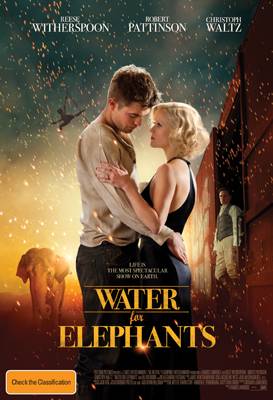
Water For Elephants
Cast: Reese Witherspoon, Robert Pattinson, Christophe WaltzDirector: Francis Lawrence
Genre: Drama
Rated: M
Running Time: 121 minutes
Synopsis: During the Great Depression, Jacob, a penniless 23-year-old veterinary school student, parlays his expertise with animals into a job with a second-rate traveling circus. He falls in love with Marlena, one of the show's star performers, but their romance is complicated by Marlena's husband, the charismatic but unbalanced circus boss.
Release Date: May 12th, 2011
Based on the acclaimed number-one bestseller, Water For Elephants presents an epic tale of forbidden love in a magical place filled with adventure, wonder and great danger.
A veterinary student from the wrong side of the tracks, Jacob, meets and falls in love with Marlena, a star performer in a circus of a bygone era. They discover beauty amidst the world of the Big Top, and come together through their compassion for a special elephant. Against all odds - including the wrath of Marlena's charismatic but dangerous husband August - Jacob saves Marlena from an unhappy life and they find lifelong love.
When Sara Gruen's novel Water for Elephants was published in 2006, it became a huge success, spending 12 weeks on the New York Times bestseller list. The book continues to be a huge paperback seller, remaining on the top of the charts. Readers around the world respond to Sara Gruen's characters' joys, loves, redemptions and challenges. "Water for Elephants is about love in all its forms - between men and women, amongst families, and between people and animals," says Sara Gruen. "It's about the different ways we treat each other; sometimes we do it well, and sometimes not."
Among the book's legions of fans is Reese Witherspoon. "It's a wonderful story of love, hope, redemption, second chances and finding happiness," the Oscar®-winning actor notes. "I got so pulled into the world Sara Gruen created." Years later, Reese Witherspoon would take on the role of the book's heroine, Marlena, the star attraction of a fading circus. With Marlena's shimmering eyes and hair, porcelain skin, pink sequins that make her glisten and sparkle, and her ability to connect with animals, she is a beautiful, natural and graceful performer. But Marlena's personal life contrasts strongly with the joy she finds performing. She is trapped in a difficult and complex marriage with the circus ringmaster and owner, August, an imposing and charismatic presence who can charm, seduce, or attack with equal power.
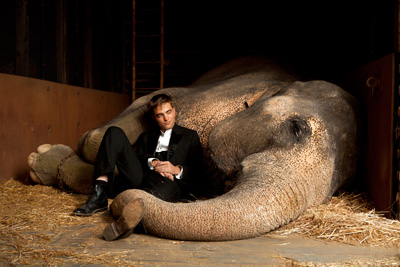 Twilight star Robert Pattinson was another admirer of Sara Gruen's characters and world. "Someone sent me the book, and I immediately connected to it," he remembers. Robert Pattinson would later agree to portray Jacob Jankowski, who after a personal tragedy, wanders without destination before hopping aboard a random train, which turns out to be the home of The Benzini Bros. Circus. That fateful train ride ultimately takes Jacob to Marlena, and a romance and destiny that neither could have imagined.
Twilight star Robert Pattinson was another admirer of Sara Gruen's characters and world. "Someone sent me the book, and I immediately connected to it," he remembers. Robert Pattinson would later agree to portray Jacob Jankowski, who after a personal tragedy, wanders without destination before hopping aboard a random train, which turns out to be the home of The Benzini Bros. Circus. That fateful train ride ultimately takes Jacob to Marlena, and a romance and destiny that neither could have imagined. Not long after the book's publication, these beloved characters began their journey from the printed page to the big screen. In late-2008, producer Gil Netter (Marley & Me) approached director Francis Lawrence (I Am Legend) about turning Water for Elephants into a film. "I read the book in one sitting," Francis Lawrence recalls. "It was such a great visceral experience, and the story existed in a very rich and detailed world. I loved the characters and the emotion."
Francis Lawrence focused on the relationship between Marlena and Jacob, and on recreating the magical world Sara Gruen had detailed in her novel. "The relationship between Marlena and Jacob that we built in the movie is really one of my favorite things," he explains. "It's a really nice slow burn. I think Jacob falls instantly for Marlena's beauty, magic, strength and confidence. But Marlena is guarded; she doesn't trust many people. Jacob starts to break through that wall and he becomes someone quite unexpected for Marlena in her world. I think she falls for his morality."
Like the characters he would be bringing to life on the screen, Francis Lawrence was drawn to the world of the Big Top. "I have always been very intrigued by the circus, especially those of the 1920s and '30s," he says. "There was something special about it then - the steam trains, the beautiful canvas tents, the elegant performers and the exotic animals."
Francis Lawrence and producer Erwin Stoff brought the project to noted screenwriter Richard LaGravenese, an Oscar nominee for his work on The Fisher King, to adapt Sara Gruen's book. They were well aware of the challenges and responsibilities of being entrusted with a beloved story and cast of characters, and of paring down a 400-page book into a workable screenplay. Francis Lawrence explains: "This was my first time working with a screenwriter to adapt a book, and our approach was to try and stay true to its themes, tone and broad strokes. There were some key moments in the book that are important to get into the movie, but part of the fun is interpreting the original material and coming up with new ideas, as well."
Richard LaGravenese elaborates: "When a book is well-loved, it's important to keep what readers expect, but at the same time you have to understand that, when reading a story, you're seeing and hearing characters in your head, and everyone has their own versions in their own minds. When you see the story played on screen with real people it becomes literal - one version - and there are certain ideas that work in a book that wouldn't work on screen."
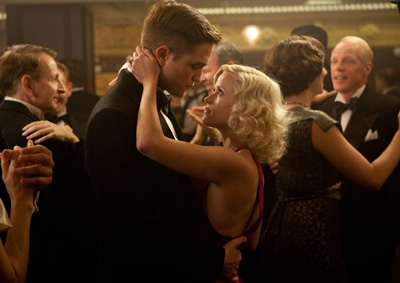 Working under Francis Lawrence's guidance, Richard LaGravenese fine-tuned the screenplay over several drafts. Their key task, says Richard LaGravenese, was "making the three principal characters more active, and re-inventing Marlena's and August's backstories. We wanted every character's reasons to be understood, so that morally, who's right and who's wrong, is a little more complex. No one is 100 percent innocent."
Working under Francis Lawrence's guidance, Richard LaGravenese fine-tuned the screenplay over several drafts. Their key task, says Richard LaGravenese, was "making the three principal characters more active, and re-inventing Marlena's and August's backstories. We wanted every character's reasons to be understood, so that morally, who's right and who's wrong, is a little more complex. No one is 100 percent innocent." Reese Witherspoon sparked to this element. "Marlena was an orphan who was working as a seamstress in a dress shop where August discovered her when his circus visited her town," she explains. "He became infatuated with Marlena, invited her to come along with the circus and became a kind of Svengali, training her as a horseback rider and performer." Marlena trades her life of poverty for a chance at glamour and stardom - but there would be consequences to that choice. August, too, had no family, and built a life for himself by rebuilding a dying show from the ground up.
Other changes from the book included combining two of Sara Gruen's characters -- Marlena's husband August, who in the novel is the head animal trainer; and Uncle Al, the book's violent, abusive circus owner. "Combining August and Uncle Al made the August character more dangerous, which is always a good thing," notes Richard LaGravenese. The screenwriter also reworked and enriched how a now-aged Jacob (portrayed by Academy Award® nominee Hal Holbrook) recounts his story of his experiences with the Benzini Bros. Circus and his relationship with longtime love, Marlena.
Sara Gruen was impressed with the adaptation. "I thought the changes [in the screenplay] were brilliant," she says. "Writing a screenplay is a completely different set of skills than writing a novel. Francis Lawrence and Richard LaGravense took something that takes approximately 14 hours to read, and transformed it into something that can be watched in a couple of hours. They certainly did not diminish the story."
Even before work began on the script, Reese Witherspoon became the first actor to join Water For Elephants. "Reese Witherspoon was a true creative partner in the early days of putting the project together," says Francis Lawrence. "She brought so much to the film and to the character of Marlena. Reese Witherspoon is a fantastic actress, beautiful and timeless, loves animals - and is fearless; she'll try anything. Marlena is a bit tough and hardened; she isn't a victim of August or anyone else. Reese Witherspoon, too, can be very strong."
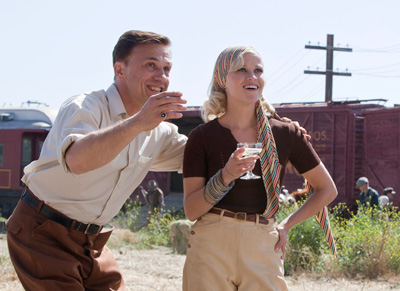 Unlike Marlena, Jacob had a protected life with loving parents. But on the brink of graduating from Cornell University's veterinary school, Jacob's world is shattered when he learns of his parents' deaths in an automobile accident. Broken emotionally and financially, Jacob is forced to leave Cornell. He takes to the road, without direction. Impulsively, he boards a passing train that houses The Benzini Bros Circus. Nearly seven decades later, pondering that fateful moment, the now-aged Jacob would wonder, "Did I pick the train or did it pick me?"
Unlike Marlena, Jacob had a protected life with loving parents. But on the brink of graduating from Cornell University's veterinary school, Jacob's world is shattered when he learns of his parents' deaths in an automobile accident. Broken emotionally and financially, Jacob is forced to leave Cornell. He takes to the road, without direction. Impulsively, he boards a passing train that houses The Benzini Bros Circus. Nearly seven decades later, pondering that fateful moment, the now-aged Jacob would wonder, "Did I pick the train or did it pick me?" With no other prospects, Jacob joins the troupe. At first, the once-sheltered young man is lost and even fearful for his life, among the chaos, color and danger that surround him. Jacob begins his tenure at the Benzini Bros. Circus on the bottom rung of the ladder, even lower than the roustabouts who handle the daily manual labor. When August, the ringmaster and circus master learns of Jacob's veterinary studies, he promotes him to tending to the medical needs of the animals. That, in turn, brings Jacob ever closer to Marlena, the show's star performer. His attraction to Marlena is immediate and electric. "Jacob notices Marlena's beauty and charisma right away," Pattinson says. "He also notes her strong bond with the animals she works with during her performances; that's another thing they share."
An already professed fan of the book, Robert Pattinson became even more intrigued about a movie adaptation when he read the script. "Somehow, it seemed like Francis Lawrence and Richard LaGravense had added even more to the story," says the actor. Francis Lawrence was convinced that Robert Pattinson was right for the role after he discussed the project with him for several hours. "I thought Robert Pattinson was Jacob Jankowski," says the filmmaker. "It was difficult to find a young man of age 23 or 24 who didn't seem too young for the part. Robert Pattinson was already a man. He is thoughtful, intelligent, empathetic, strong, and confident."
Robert Pattinson's quick grasp of the character was impressive. "Jacob is mysterious and quiet; he's an observer," says the actor. "He's always watching people and he has an intuitive relationship with animals, and a deep understanding of human nature."
All of Jacob's traits and abilities come to the fore as he becomes increasingly close to Marlena. At first, she wants little to do with the newcomer, but when he comes to the aid of Marlena's beloved and suffering horse, they share a moment of intimacy and tenderness that neither can shake. But there's a powerful presence - almost a force - standing between them: August, who his employees call, with a mixture of fear and respect, "Lord and Master of the Known and Unknown Universe." An imposing and charismatic leader, August runs the circus at times like a tyrant, and at others like a caring patriarch. Similarly, his love and kindness toward Marlena can morph - in a flash - to abuse, anger and unfathomable darkness. When Jacob witnesses August's dark side, he does everything in his power to once and for all free Marlena from his tyranny.
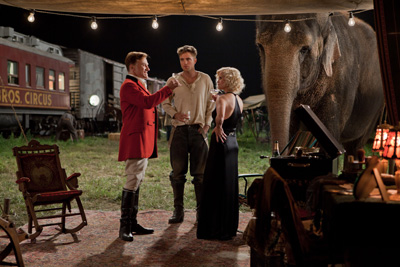 Reese Witherspoon praises Christoph Waltz, a Best Supporting Oscar winner for his work in Inglourious Basterds, for "really getting to the bottom of August's darkness. He just does an extraordinary job of playing the character's contrasting sides." Adds Francis Lawrence: "Christoph Waltz came to us with such love for the character and the story, as well as for its world and themes. He was perfect for the role because of his electric charm and his danger. He brings a key mix of intelligence, sharpness and humor."
Reese Witherspoon praises Christoph Waltz, a Best Supporting Oscar winner for his work in Inglourious Basterds, for "really getting to the bottom of August's darkness. He just does an extraordinary job of playing the character's contrasting sides." Adds Francis Lawrence: "Christoph Waltz came to us with such love for the character and the story, as well as for its world and themes. He was perfect for the role because of his electric charm and his danger. He brings a key mix of intelligence, sharpness and humor." Christoph Waltz himself hesitates to divulge much about his interpretation of August, instead hoping audiences will discover and make their own decisions about the character. But now having portrayed a ringmaster and animal trainer, the acclaimed actor is more expansive about his admiration for those who make their living training our four-legged friends. "I wouldn't have the patience to train an animal, so I hardly have the patience to play an animal trainer," Christoph Waltz jokes. "I admire [the production's principal elephant trainer] Gary Johnson, who is calm, quiet, centered and patient. To be around Gary Johnson makes me calm and centered, and I can watch and learn," he says with a laugh.
Amid the magical world of the circus and its bigger-than-life performers, the Big Top's towering star is Rosie the Elephant, who is nearly nine feet tall and weighs 9,000 pounds. August buys Rosie, a cast-off from a circus that has fallen to the hard times, in a last-ditch effort to save The Benzini Bros show. Little does he know that his new star animal attraction will not only bring him the financial success he craves, but serve as the catalyst that brings Marlena and Jacob together.
Rosie is portrayed by Tai, age 42, a motion picture veteran ("Bigger than Life," "The Jungle Book"), who lives in Perris, California with principal trainer Gary Johnson, of Have Trunk Will Travel Inc.®, an organisation dedicated to providing the public with safe, educational and recreational access to elephants. Tai was an instant hit with all cast and crew members, who marveled at not only her thespian skills, but at the gentle giant's calm amidst the controlled chaos of a bustling film set.
Reese Witherspoon, who shares the most scenes with Tai, developed an especially close bond with the elephant. The two stars actually began work together long before cameras rolled on location in Piru, California. For three months prior to the start of principal photography, Reese Witherspoon and Tai worked, says the actress, "on everything from her lifting me in the air to me learning how to flip backwards on Tai." Even the simplest interactions were challenging. "I'm not very big and Tai is not very small," jokes Reese Witherspoon. "I had to learn how to step on her trunk and hurdle myself on top of her. It was very complicated, but I finally got it. It was one of my greatest accomplishments!" Reese Witherspoon's training at "circus school" also encompassed work with horses, and trapeze work.
Tai also wasn't immune to the considerable charms of Robert Pattinson, and the elephant often playfully flirted with the actor, who often hid treats on his person for her to find. The feeling was mutual. Says Robert Pattinson: "Rosie's demeanor is so fascinating that it magnifies the characters' experiences with her. And I felt exactly the same way working with Tai. I've never been next to such an enormous animal that is so graceful and careful around people."
The filmmakers took extra-special care around Tai during the filming of scenes where August is abusive to Rosie. The visual effects team and elephant trainer Gary Johnson devised ingenious methods to make it appear as if Christoph Waltz's August was striking the elephant - and appear as if Rosie was reacting to those fictional strikes - through digital wizardry and Johnson's specially-designed series of behaviors for Tai. The elephant was never struck. "We never even used a rubber or a spongy hook with Tai," says Francis Lawrence. "The hook never got anywhere near her." Animal Humane Association monitored these and all other scenes involving animals.
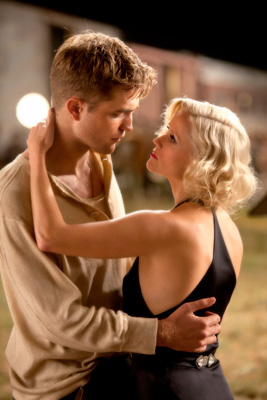 Under the Big Top
Under the Big TopIn realising Francis Lawrence's vision of circus life during the Great Depression, the director and his design chiefs worked to merge the rigorously authentic with the hauntingly romantic. "Everyone that came on board this movie loved the era and loved the circus," notes Francis Lawrence. "We wanted Water For Elephants to be real and genuine, but we also wanted to convey a very romantic notion of what circus life was like in the 1930s."
The principal set was constructed in Piru, California. The Southern California location was chosen for its close proximity to the exotic animals required by the story, as well as for its access to railroad cars and tracks. The company also filmed in various other Southern California locations, including the Twentieth Century Fox backlot, which was home to a glorious circus parade. The production also made a quick stop in Chattanooga, Tennessee, to make use of some period trains.
The physical layout of the massive Piru-based production encompassed tents for the big top, a menagerie, a tent for the "Coochie Girls," a star tent for Marlena, and several other smaller tents. The largest tent - the Big Top - measured 160-feet by 100-feet; its bleachers could hold up to 800 people. "One of our goals [in creating the fictional Benzini Bros. Circus] was to create our own version of a backlot where we would have complete freedom to shoot wherever we wanted and have lots of depth and authenticity," Francis Lawrence explains. "But we built our circus just as a second rate circus would have built theirs, back in its day. The tents were put up with the same rigging; the train cars were outfitted with the appropriate accessories; the costumes were all period-authentic; and the casting for our circus employees was top notch. All of these elements came together to create a beautiful, authentic atmosphere that inspired us. It was like time traveling to the '30s, every morning."
The filmmakers already had been given a head start in their design work, courtesy of the sharp detail and descriptions in Sara Gruen's novel, many of whose readers felt like they were experiencing the sights, sounds and smells of a struggling '30s circus. Production designer Jack Fisk, whose frequent collaborations with renowned filmmaker Terrence Malick are noted for their creations of natural, real and textured worlds; director of photography Rodrigo Prieto, whose meticulous attention to visual and dramatic detail are evident in such films as Amores Perros, Brokeback Mountain and the recent Wall Street: Money Never Sleeps; and costume designer Jacqueline West, a two-time Oscar nominee, most recently for The Curious Case of Benjamin Button, were instrumental in making Water For Elephants' Benzini Bros. look unlike any other fictional big screen circus.
When arriving each day at the set he had designed, Jack Fisk shared Francis Lawrence's feeling of having traveled through time. "There were moments when I walked into our Big Top - and with the practical lighting, the bleachers we built, and the smell of the animals - it was like going back in time. Those are moments I live for. That tent was alive."
That realism stems in large part from Jack Fisk's prodigious research. He spent hours combing through books about the circuses of the era, and through tens of thousands of period photographs. "Those old black-and-white photos of the canvas tents were beautiful because they're lit in a beautiful tungsten light, but you can see the mold, dirt, footprints, grass stains, mud and dust," Jack Fisk recalls. "It looks very real and tactile, and that's what we were aiming for with our circus."
The work of costume designer Jacqueline West was instrumental in creating the dichotomy between the circus glitter and the world outside the big top in Depression-era America. West's designs for the principals, including August and Marlena, were vibrant with color, while the background audience wore a more muted, Depression-appropriate palette. "I wanted all the color and glitter to jump out of the circus itself, away from the more monochromatic crowd," notes Jacqueline West.
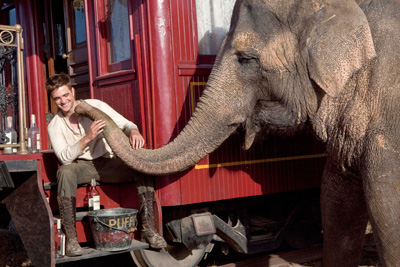 Marlena's outfits were based on those worn by 1930s film stars, as well on those that adorned real circus women of the era. "As Marlena, Reese Witherspoon's outfits included a beaded evening dress and parade costume with marabou feathers made from vintage antique pieces put together in a patchwork. Her evening gowns reflect those she saw at the movies, worn by some of the period's top stars, including Jean Harlow, Carol Lombard and Constance Bennett."
Marlena's outfits were based on those worn by 1930s film stars, as well on those that adorned real circus women of the era. "As Marlena, Reese Witherspoon's outfits included a beaded evening dress and parade costume with marabou feathers made from vintage antique pieces put together in a patchwork. Her evening gowns reflect those she saw at the movies, worn by some of the period's top stars, including Jean Harlow, Carol Lombard and Constance Bennett." A testament to the sets' mix of period realism and glamour - as well as to the filmmakers' devotion to the novel - was Sara Gruen's reaction when she visited the set. "I was speechless," she remembers. "You know, a few years ago, all of this was entirely in my head, and now here it is. It's so close to what I had imagined. It's a very surreal experience."
From the scripting stage to pre-production, through production and the final touches of post production as Water For Elephants neared its worldwide release, the filmmakers endeavored to bring to life this world, its characters, and a story of a forbidden attraction that becomes a lifelong love. "People have always wanted to have their 'day at the circus' - a joyful moment taking them outside their everyday lives," notes Reese Witherspoon. "I hope that's what we've done here: create something that people will enjoy." Adds Francis Lawrence: "One of the reasons I did Water For Elephants is because it has love, wish fulfillment, redemption, magic and beauty. I hope audiences latch on to all of those things."
MORE
- Mission: Impossible Fallout
- Glenn Close The Wife
- Allison Chhorn Stanley's Mouth Interview
- Benicio Del Toro Sicario: Day of the Soldado
- Dame Judi Dench Tea With The Dames
- Sandra Bullock Ocean's 8
- Chris Pratt Jurassic World: Fallen Kingdom
- Claudia Sangiorgi Dalimore and Michelle Grace...
- Rachel McAdams Disobedience Interview
- Sebastián Lelio and Alessandro Nivola...
- Perri Cummings Trench Interview



